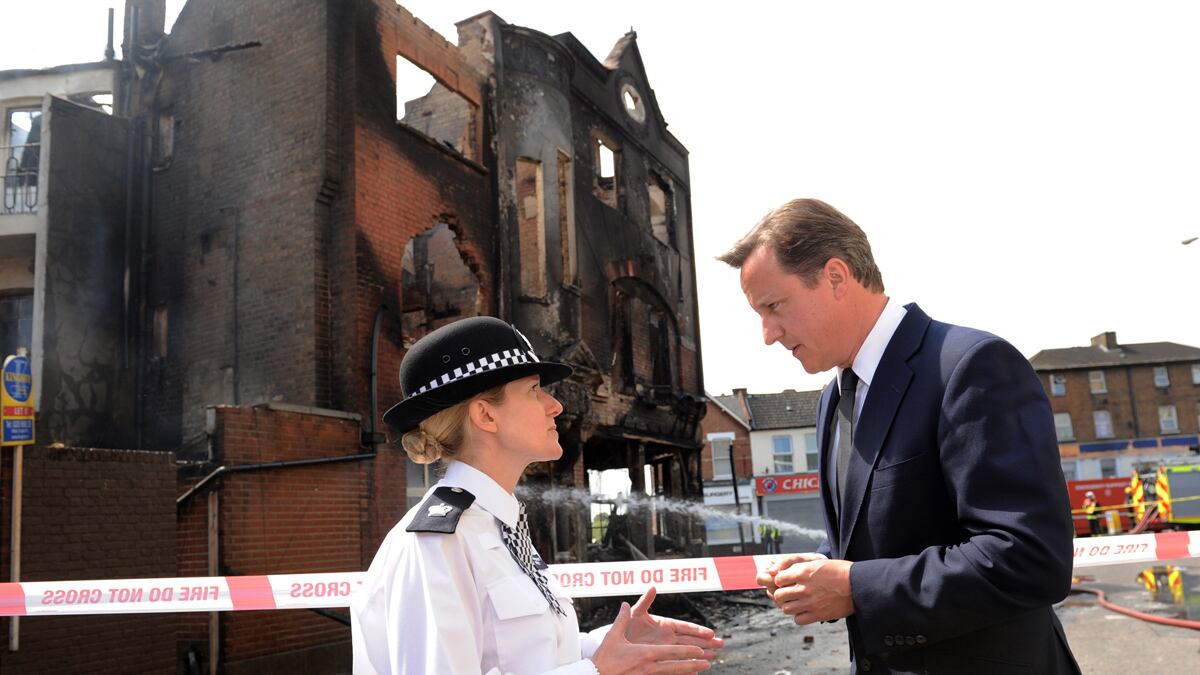Like an old-style Conservative, David Cameron is talking tough. After four nights of mayhem on Britain’s streets, the prime minister today promised the police his support in whatever tactics they chose to employ—rough or not. The use of plastic bullets has been authorized. Water cannons will be on standby. All those convicted of disorderly violence should expect a jail term. “Every contingency is being looked at: nothing is off the table,” Cameron said. “A fight back is needed and a fight back is underway.”
Without a doubt, that’s the punchy, uncompromising tone the public wants to hear. If London was calm last night, other cities were feeling the heat. More than 100 people were arrested in Manchester as copycat violence and looting spread across the country. In Birmingham, three men were killed by a hit-and-run motorist while guarding their community from rioters. All police jail cells in London are full, and courts are sitting through the night. Tomorrow, the prime minister will address Parliament, recalled to consider the crisis. Jittery city dwellers want the reassurance of firm leadership.
But if the harder approach helps to soothe public nerves, it’s also sound politics. Tainted by what some see as mushy liberalism, Cameron knows he has ground to recover with the voters. Sure, he broke off his holiday in Italy to take command in Downing Street almost within 48 hours of the first flare-up. But when it comes to crisis management, it’s never too early for a politician to be back at his desk.
Already his enemies in the press are alleging indifference or at least poor judgment over failing to return sooner. In the words of Kevin Maguire, a columnist for the left-leaning Mirror: “Nero fiddled while Rome burned and this smug, part-time Premier opted to sip cappuccino in Tuscany while London went up in flames. The storm engulfing a Dithering Dave is the Prime Minister's very own personal Hurricane Katrina.”

What’s more, Cameron knows that his patrician background leaves him dangerously vulnerable to attack. His opponents are waiting to highlight the slightest evidence that as the privileged product of Eton and Oxford, the prime minister can’t appreciate the anguish of inner-city communities who have seen their neighborhoods trashed and yearn for a more vigorous response from the police.
And his opponents aren’t all on the left. In the early years of his leadership, Cameron worked hard to dispel the image that the Conservatives are the “nasty party”—a term coined by Theresa May, now his Home Secretary—and are forever obsessed with crime and punishment. Plenty on the right wing of his own party still suspect the prime minister of a lukewarm commitment to their favorite cause. It doesn’t help that the latest round of austerity cuts includes a hefty reduction in the police budget.
In particular, Cameron won’t be allowed to forget a controversial speech he gave in 2006, when he urged greater understanding of the despairing youth of Britain’s alienated underclass, his “hug a hoodie” speech, a name taken from the hooded sweatshirts now familiar as the standard dress of the rioters. According to the Cameron of 2006, it was vital to appreciate the causes of youth crime and disaffection, rather than focusing only on its symptoms. In Cameron’s words: “When you see a child walking down the road, hoodie up, head down, moody, swaggering, dominating the pavement—think what has brought that child to that moment.”
The Cameron of 2011 sounds less forgiving. In his speech today, he spoke of the young rioters’ “mindless selfishness” and of the “pockets of our society that are not just broken but, frankly, sick.”
At least for now, it’s back to stricter policing and the language of moral discipline. Cameron is fighting back, a move that both his party and a nervous public will applaud.






